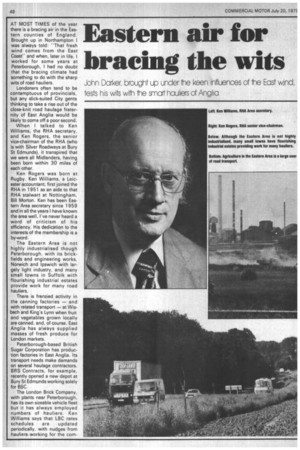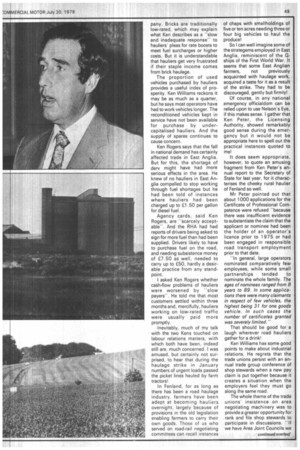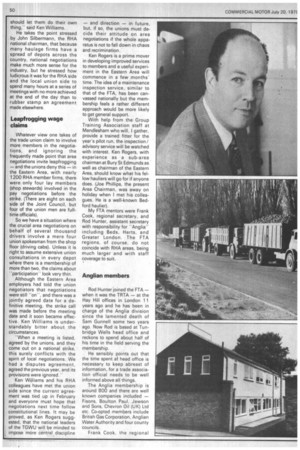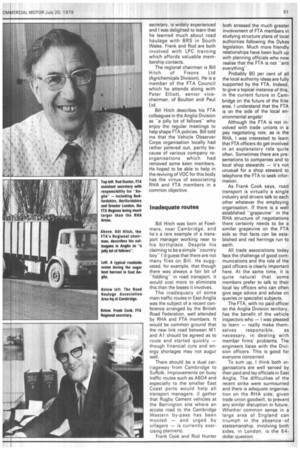Eastern air for bracing the wits
Page 50

Page 51

Page 52

Page 53

If you've noticed an error in this article please click here to report it so we can fix it.
John Darker, brought up under the keen influences of the East wind, tests his wits with the smart hauliers of Anglia
AT MOST TIMES of the year there is a bracing air in the Eastern counties of England. Brought up in Northampton I was always told: "That fresh wind comes from the East Coast" and when, later in life, I worked for some years at Peterborough, I had no doubt that the bracing climate had something to do with the sharp wits of road hauliers.
Londoners often tend to be contemptuous of provincials, but any slick-suited City gents thinking to take a rise out of the close-knit road haulage fraternity of East Anglia would be likely to come off a poor second.
When I talked to Ken Williams, the RHA secretary, and Ken Rogers, the senior vice-chairman of the RHA (who is with Silver Roadways at Bury St Edmunds), it transpired that we were all Midlanclers, having been born within 30 miles of each other.
Ken Rogers was born at Rugby. Ken Williams, a Leicester accountant, first joined the RHA in 1951 as an aide to that RHA stalwart at Nottingham, Bill Morton. Ken has been Eastern Area secretary since 1959 and in all the years I have known the area well, rye never heard a word of criticism of his efficiency. His dedication to the interests of the membership is a by-word.
The Eastern Area is not highly industrialised though Peterborough, with its brickfields and engineering works, Norwich and Ipswich with largely light industry, and many small towns in Suffolk with flourishing industrial estates provide work for many road hauliers.
There is frenzied activity in the canning factories — and with related transport — at Wisbech and King's Lynn when fruit and vegetables grown locally are canned, and, of course, East Anglia has alWays supplied masses of fresh produce for London markets.
Peterborough-based British Sugar Corporation has production factories in East Anglia. Its transport needs make demands on several haulage contractors. BRS Contracts, for example, recently opened a new depot at Bury St Edmunds working solely for BSC.
The London Brick Company, with plants near Peterborough, has its own sizeable vehicle fleet but it has always employed numbers of hauliers. Ken Williams says that LBC rates schedules are updated periodically, with nudges from hauliers working for the corn pany. Bricks are traditionally low-rated, which may explain what Ken describes as a "slow and inadequate response" to hauliers' pleas for rate boosts to meet fuel surcharges or higher costs. But it is understandable that hauliers get very frustrated if their staple income comes from brick haulage.
The proportion of used vehicles purchased by hauliers provides a useful index of prosperity. Ken Williams reckons it may be as much as a quarter, but he says most operators have had to work vehicles longer. The reconditioned vehicles kept in service have not been available for purchase by undercapitalised hauliers. And the supply of spares continues to cause concern.
Ken Rogers says that the fall in national demand has certainly affected trade in East Anglia. But for this, the shortage of dery might have had more serious effects in the area. He knew of no hauliers in East Anglia compelled to stop working through fuel shortages but he had been told of instances where hauliers had been charged up to £1.50 per gallon for diesel fuel.
Agency cards, said Ken Rogers, are "scarcely acceptable". And the RHA had had reports of drivers being asked to sign for more fuel than had been supplied. Drivers likely to have to purchase fuel on the road, and needing subsistence money of £7.50 as well, needed to carry up to £50, hardly a desirable practice from any standpoint.
I asked Ken Rogers whether cash-flow problems of hauliers were worsened by "slow payers". He told me that most customers settled within three months and, mercifully, hauliers working on low-rated traffic were usually paid more promptly.
Inevitably, much of my talk with the two Kens touched on labour relations matters, with which both have been, indeed still are, much concerned. I was amused, but certainly not surprised, to hear that during the haulage strike in January numbers of urgent loads passed the picket lines hauled by farm tractors!
In Fenland, for as long as there has been a road haulage industry, farmers have been adept at becoming hauliers overnight, largely because of provisions in the old legislation enabling farmers to carry their own goods. Those of us who served on road-rail negotiating committees can recall instances of chaps with smallholdings of five or ten acres needing three or four big vehicles to haul the produce!
So I can well imagine some of the strategems employed in East Anglia, reminiscent of the Qships of the First World War. It seems that some East Anglian farmers, not previously acquainted with haulage work, acquired a taste for it as a result of the strike. They had to be discouraged, gently but firmly!
Of course, in any national emergency officialdom can be relied upon to use Nelson's Eye, if this makes sense_ I gather that Ken Peter, the Licensing Authority, showed remarkably good sense during the emergency but it would not be appropriate here to spell out the practical instances quoted to me!
It does seem appropriate, however, to quote an amusing fragment from Ken Peter's annual report to the Secretary of State for last year, for it characterises the cheeky rural haulier of Fenland so well.
Mr Peter pointed out that about 1000 applications for the Certificate of Professional Competence were refused "because there was insufficient evidence to substantiate the claim that the applicant or nominee had been the holder of an operator's licence prior to 1975 or had been engaged in responsible road transport employment prior to that date.
"In general, large operators nominated comparatively few employees, while some small partnerships tended to nominate the whole family. The ages of nominees ranged from 8 years to 89. In some applications there were many claimants in respect of few vehicles, the highest being 31 for one goods vehicle. In such cases the number of certificates granted was severely limited."
That should be good for a laugh wherever road hauliers gather for a drink!
Ken Williams has some good points to make about industrial relations. He regrets that the trade unions persist with an annual trade group conference of shop stewards when a new pay claim is put together because it creates a situation when the employers feel they must go along the same road.
The whole theme of the trade unions' insistence on area negotiating machinery was to provide a greater opportunity for rank and file shop stewards to participate in discussions. "If we have Area Joint Councils we should let them do their own thing,' said Ken Williams.
He takes the point stressed by John Silbermann, the RHA national chairman, that because many haulage firms have a spread of depots across the country, national negotiations make much more sense for the industry, but he stressed how ludicrous it was for the RHA side and the local union side to spend many hours at a series of meetings with no more achieved at the end of the day than to rubber stamp an agreement made elsewhere.
Leapfrogging wage claims
Whatever view one takes of the trade union claim to involve more members in the negotiations, and ignoring the frequently made point that area negotiations invite leapfrogging — and the unions deny this — in the Eastern Area, with nearly 1200 RHA member firms, there were only four lay members (shop stewards) involved in the pay negotiations before the strike, (There are eight on each side of the Joint Council, but four of the union men are fulltime officials).
So we have a situation where the crucial area negotiations on behalf of several thousand drivers involve a mere four union spokesman from the shop floor (driving cabs). Unless it is right to assume extensive union consultations in every depot where there is a membership of more than two, the claims about 'participationlook very thin.
Although the Eastern Area employers had told the union negotiators that negotiations were still 'on-, and there was a jointly agreed date for a definitive meeting, the strike call was made before the meeting date and it soon became effective. Ken Williams is understandably bitter about the circumstances.
"When a meeting is listed, agreed by the unions, and they come out on a national strike, this surely conflicts with the spirit of local negotiations. We had a disputes agreement, agreed the previous year, and its provisions were ignored."
Ken Williams and his RHA colleagues have met the union side since the current agreement was tied up in February and everyone must hope that negotiations next time follow constitutional lines. It may be proved, as Ken Rogers suggested, that the national leaders of the TGWU will be minded to impose more central discipline — and direction — in future, but, if so, the unions must decide their attitude on area negotiations if the whole apparatus is not to fall down in chaos and recrimination.
Ken Rogers is a prime mover in developing improved services to members and a useful experiment in the Eastern Area will commence in a few months' time, The idea of a maintenance inspection service, similar to that of the FTA, has been canvassed nationally but the membership feels a rather different approach would be more likely to get general support.
With help from the Group Training Association staff at Mendlesham who will, I gather, provide a trained fitter for the year's pilot run, the inspection! advisory service will be watched with interest. Ken Rogers, with experience as a sub-area chairman at Bury St Edmunds as well as chairman of the Eastern Area, should know what his fellow hauliers will go for if anyone does. (Joe Phillips, the present Area Chairman, was away on holiday when I met his colleagues. He is a well-known Bedford haulier).
My FTA mentors were Frank Cook, regional secretary, and Rod Hunter, assistant secretary with responsibility for -Anglia' including Beds, Herts, and Greater London. The FTA regions, of course, do not coincide with RHA areas, being much larger and with staff coverage to suit.
Anglian members
Rod Hunter joined the FTA — when it was the TRTA — at the Hay Hill offices in London 11 years ago and he has been in charge of the Anglia division since the lamented death of Sam Gunnell some two years ago. Now Rod is based at Tunbridge Wells head office and reckons to spend about half of his time in the field serving the membership.
He sensibly points out that the time spent at head office is necessary to keep abreast of information, for a trade association official needs to be well informed above all things.
The Anglia membership is around 800 and there are well known companies included — Fisons, Boulton Paul, Jewson and Sons, Chevron Oil (UK) Ltd etc. Co-opted members include British Gas Corporation, Anglian Water Authority and four county councils.
Frank Cook, the regional secretary, is widely experienced and I was delighted to learn that he learned much about road haulage with BRS in South Wales. Frank and Rod are both involved with LPC training which affords valuable membership contacts.
The regional chairman is Bill Hitch of Fisons Ltd (Agrichemicals Division). He is a member of the ETA Council which he attends along with Peter Elliott, senior vicechairman, of Boulton and Paul Ltd.
Bill Hitch describes his FTA colleagues in the Anglia Division as "a jolly lot of fellows" who enjoy the regular meetings to help shape FTA policies. Bill told me that the Vehicle Observer Corps organisation locally had rather petered out, partly because of various company reorganisations which had removed some keen members. He hoped to be able to help in the reviving of VOC for this body has the virtue of associating RHA and FTA members in a common objective.
Inadequate routes Bill Hitch was born at Fowlmere, near Cambridge, and he's a rare example of a transport manager working near to his birthplace. Despite his claiming lobe a simple "country boy' I'd guess that there are not many flies on Bill. He suggested, for example, that though there was always a fair bit of -fiddling" in road transport, it would cost more to eliminate this than the losses it involves.
The inadequacy of some main traffic routes in East Anglia was the subject of a recent conference arranged by the British Road Federation, well attended by RHA and FTA members. It would be common ground that the new link road between MI and Al should be agreed as to route and started quickly — though financial cuts and energy shortages may not augur well.
There should be a dual carriageway from Cambridge to Suffolk_ Improvements on busy traffic routes such as A604 and especially to the smaller East Coast ports would help all transport managers_ (I gather that Rugby Cement vehicles at the Barrington site where an access road to the Cambridge Western by-pass has been mooted — and urged by villagers — is currently exercising planners).
Frank Cook and Rod Hunter
both stressed the much greater involvement of FTA members in studying structure plans of local authorities following the Dykes legislation. Much more friendly relationships have been built up with planning officials who now realise that the FTA is not "anti everything-.
Probably 80 per cent of all the local authority ideas are fully supported by the FTA. Indeed, to give a topical instance of this, in the current furore in Cambridge on the future of the Kite area, I understand that the FTA is on the side of the local environmental angels!
Although the ETA is not involved with trade unions in a pay negotiating role, as is the RHA, I was interested to learn that FTA officers do get involved in an explanatory role quite often. Sometimes there are presentations to companies and to local shop stewards — it's not unusual for a shop steward to telephone the FTA to seek information.
As Frank Cook says, road transport is virtually a single industry and drivers talk to each other whatever the employing organisation. If there is a well established "grapevine" in the RHA structure of negotiations there certainly needs to be a similar grapevine on the FTA side so that facts can be established and red herrings run to earth.
All trade associations today face the challenge of good communications and the role of the paid officers is clearly important here. At the same time, it is quite natural that some members prefer to talk to their local lay officers who can often give sage advice and advise on queries or specialist subjects.
The FTA, with no paid officer on the Anglia Division territory, has the benefit of the vehicle inspectors who — I was pleased to learn — really make them selves responsible, as necessary, in dealing with member firms' problems. The engineers liaise with the Division officers. This is good for everyone concerned.
To sum up, I think both organisations are well served by their paid and lay officials in East Anglia. The difficulties of the recent strike were surmounted and there is adequate organisation on the RHA side, given trade union goodwill, to prevent any similar disruption in future. Whether common sense in a large area of England can triumph in the absence .of statesmanship, involving both sides, in London, is the 64dollar question.




















































































































